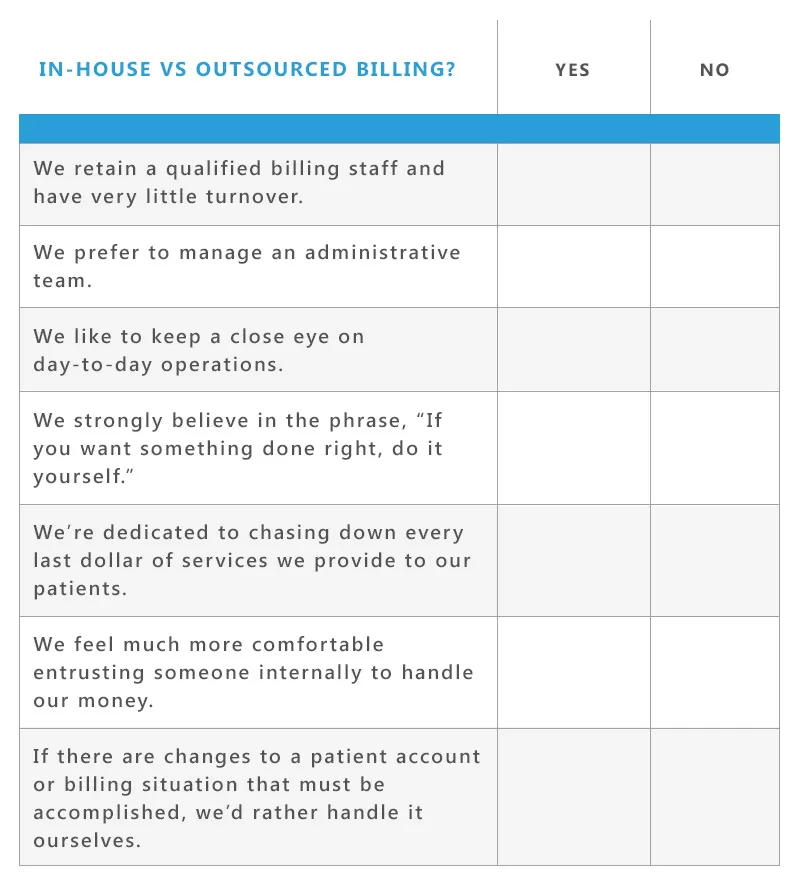It’s time, you’re looking for a new revenue cycle software solution. Perhaps you’re deciding between in-house or outsourced billing. Maybe you’re searching for an upgrade from your current solution. Whatever the case may be, you’re probably feeling a little overwhelmed right now… or a lot. Narrowing down your options is no easy feat. At the end of the day, your top priority is providing care to your patients, but the financial aspect of your business should never be placed on the back-burner. So, what should you really focus on when choosing a billing partner?
In-house vs. Outsourced Billing
Whether you choose to manage your own billing or outsource is really based on preference and workflow. Here’s a checklist that will help you make that decision: revenue cycle solutions

If you answered “Yes” to the majority of these questions, you should consider in-house billing. You have total control over your billing operations – make immediate changes and essentially have your hands in the heart of your practice. Alternatively, if you answered “No”, consider outsourcing instead. You’ll only have a single point of responsibility to manage your billing process and you have more time to focus on patients.
Neither option is perfect, however. In-house billing exposes your practice to more liability and disruption of operational and business continuity due to sickness, medical leave, vacations, etc. Outsourcing your billing could leave you feeling disconnected from a crucial part of your business. Ultimately, you’re still responsible for filed claims and the representation of those claims. If you relinquish too much responsibility and your billing service doesn’t educate you to validate that they’re representing you properly, you could be left in the dark. At the end of the day, it’s all about preference – management style, budget, and how much responsibility your practice is willing to take on or give up.
Considerations for In-house Revenue Cycle Management Solutions
So you've decided to keep your revenue cycle management solution in-house. What are some factors to consider when choosing between available RCM vendors?
- Cost - Does the provider offer flexible purchasing options that align with your budget and needs? Be sure to clarify which product, service, and maintenance fees are considered “added offerings” so that you have a clear idea of exactly how much you will be paying for.
- Services Offered - Does the company offer a solution that covers every step of your revenue cycle? RCM and practice management solutions should be all encompassing – with products and services that span from registration, to patient care, to patient follow-up.
- Transparency - There’s a lot to be said about a company that is upfront about costs and the services it provides. This is especially important if you decide to outsource your billing. You should be able to maintain ownership of all billing data, with full visibility into your A/R, and have access to comprehensive reporting and analytics.
- Security - Your patients trust you with the most sensitive and personal details of their health. Maintaining that trust is everything when it comes to patient relationships and the reputation of your business. It’s crucial that you choose a partner that is in compliance with government privacy laws and HIPAA regulations. Ask about cybersecurity and infrastructure support too – well-rounded solutions also provide these services to help you manage PHI.
- Staying Ahead of The Game - The healthcare industry is constantly changing, and so will the needs of your business. That’s why it’s so important to have a billing partner that moves with you to keep up with the challenges that your practice will face. Companies that offer solutions centered around the patient experience – like online payment portals and patient payment plans – recognize a huge pain point the industry is facing in terms of patient financial responsibility.
- Validation - It’s great when a company’s services are validated by third-party organizations, but what about current customers? As you narrow your search, it’s helpful to look for client testimonials and case studies on each company’s website. That’s where you’ll find honest opinion. If they don’t provide them online, call and ask. A company willing to provide you with the email or phone number to a current client is often times a clear indicator of their client relationships and level of satisfaction.
At the end of the day, no matter what company you choose, a knowledgeable and supportive team is your greatest asset, whether it’s support and implementation for an in-house solution or for an outsourcing billing company. You’re entrusting a third party with one of the most important parts of your business. A billing and practice management provider is the equivalent to a partner, and should be as interested in ensuring the success of your business as you are.